Let’s start this Rock River Arms 1911 review off with this statement: I like 1911s.
I don’t know how many I’ve owned over the years. I tend to live for a good while in the no-1911-zone, but it is always followed by an urgent desire to own another one. I’ve owned 1911s made by Colt, Rock Island Armory, AMT, Llama, Taurus and Citadel - at least those are the ones I can remember. I’ve had experience with others.
My most often purchased 1911 caliber is .45ACP. Sizes of 1911s I’ve owned would include the “Big Three” - Government (full), Commander, and Officers.
I prefer the Goldilocks version - the Commander - because it combines the best of all 1911 worlds. But, let's look at the full-size 5-inch models. One of the spiffiest, best-looking full-size 1911s I’ve ever seen is before me now - the Rock River Arms “Basic Limited” 1911. This gun incorporates some darn-near custom features but at a non-custom price. With its highly polished blue finish, sights, and serious frame checkering, the Basic Limited 1911 is a beauty. I’ve had non-1911-loving friends comment on how striking it is when I’ve pulled it out of the box for them.
This is the subject of our review - the Basic Limited 1911 by Rock River Arms.
Rock River Arms 1911 Quick Take
The Rock River Arms Basic Limited 1911A1 is a steel-frame, single-action 1911 built around a Series 70 action. The gun is tuned for accuracy and reliability. The BL1911 is suitable for competition (action or bullseye), target work, or self-defense. Hand-fitting is the key to this gun.
The barrel bushing is engraved with the serial number's last three digits. This shows that the frame, slide, barrel, and bushing started life together. They were not separated during the manufacturing process. If you are looking for a custom-level 1911 but don’t want to pay for a full-blown custom job, this gun is for you.
Pros & Cons
- Excellent, high quality materials and construction quality
- Accurate, with the right ammo
- Fully adjustable Bo-Mar Combat Sight-style rear sight with serrated front ramp sight
- Fit and finish are top-notch
- Front slide serrations
- Tight tolerances
- Decent padded, hard case
- Only one magazine is included
- Bushing wrench and required Allen wrench are not included
- Cost
- No instructions on re-assembly - two-piece guide rod can be difficult to re-install
- No dedicated owner's manual - Army manual included instead
- Lack of instructional videos from the company
BONUS OFFER: Get your free shooting range targets to print at home!
Get your free targets to print at home!
Background - Who Is Rock River Arms?
A while back, I reviewed another Rock River Arms product, an LAR-15 .223 rifle. You can check out that review for a more in-depth introduction to RRA.
In short, RRA began with two brothers, Mark and Chuck Larson, who worked for Springfield Armory. Mark was the head armorer. They left together to Les Baer in 1991 to produce custom 1911 pistols, and in 1993 to Eagle Arms to produce AR-15s. In 1997 they formed their own company, Tolerance Plus, which later became RRA.
Rock River Arms triumphed in 2003 when they won a Drug Enforcement Agency contract. They were on the hook to produce 5,000 new AR-style rifles. The success of this led to contracts with the F.B.I. and the U.S. Marshalls.
You can say that the AR-style rifle put Rock River Arms of Colona, Illinois on the map. Yet the DNA of the company has always been pistols - they started with them and stuck with them over the years.
Who Is This Gun For?
Well, I’ll start by saying who the gun isn’t for - it is not a first-time-1911-owners’ gun, for more than one reason.
First of all, is its cost.
At $2,300 it is not an entry-level 1911. It is a bridge between a production line and a full-blown custom pistol. As many of you know, a custom 1911 can cost upwards of $5,000. For about half that price, this RRA 1911 gives you a hand-fitted pistol with an accuracy guarantee.
I've owned several 1911s over the years. I will say that I've never had one in my gun safe built like this RRA - it is special.
Review - Basic Limited 1911
| Caliber: | .45 ACP |
| Capacity: | 8+1, one magazine included |
| Barrel Length: | 5.0", Kart NM barrel |
| Length: | 8.5" |
| Height: | 5.5" |
| Width: | 1.34" |
| Weight: | 38.4 oz. (my scale) with empty magazine |
| Frame: | RRA Forged NM frame with beveled mag well |
| Front Strap: | 25 LPI checkering |
| Slide: | RRA Forged NM 5 inch slide with double serrations |
| Rear Sight: | RRA low mount hidden leaf rear sight |
| Front Sight: | RRA dovetail front sight with undercut, fully profiled to radius of slide |
| Trigger: | RRA Match aluminium speed trigger; 3lbs., 2.3oz. (my scale) |
| Hammer: | Match Commander hammer and match sear |
| Mainspring Housing: | Flat with 25 LPI checkering |
| Slide Stop: | Serrated |
| Safety: | Ambidextrous, extended |
| Grip Safety: | Beavertail with memory bump |
| Ejection port: | Lowered and flared |
| Extractor: | Tuned and polished |
| Ejector: | Extended |
| Feed ramp: | Polished |
| Recoil guide rod: | Two piece |
| Grips: | Rosewood |
| Finish: | Lustrous blued finish |
| Other: | Throated RRA barrel and bushing |
| Tuning: | Tuned for total reliability |
| Accuracy: | Guaranteed to shoot 2.5 inch groups at 50 yards with 185 grain Federal Gold Medal Match Semi-Wadcutter or Atlanta Arms JHP |
Hands-On Review:
Unboxing
Let’s start at the beginning. Here is the box the gun came in:

It is well-padded, with positive latches. There are no compartments in it to put a manual in, which is a good thing since there is no owner’s manual as such. What is included are two printed items - a 1964 edition of the Army 1911A1 manual, and a single sheet describing how to take the gun apart:

A trigger lock comes with it as well. Since there's no dedicated manual, let’s hope you’re more than a little familiar with the care and feeding of your typical 1911. But this is not your typical 1911. I’ll get to one main difference in construction later, in particular the recoil spring guide rod.
So, we see a nicely-boxed pistol. When you open the box and take the gun out of its plastic sleeve, you are immediately impressed with the finish. This is one polished gun. This says a lot for the gun’s finish. I saw this very same serial-numbered gun in gun writer James Tarr’s hands in a review he did for Firearms News. They evidently have a pool of loaner guns that go out for review - nothing wrong with that. The point is that the finish is very durable. I would imagine that he and I aren’t the only two writers to review this particular gun, yet its finish still looks new.
Exceptional Polishing
The gun is polished well before bluing, as I remember guns being treated in a similar manner in the decades before polymer became king. There is something about “walnut & wood” - you older shooters know what I’m talking about. I wish now that I had hung on to several guns that I let slip through my hands over the years that were built in this fashion. Anyway, the gun is very well done and is striking when you put it in your hand and can see the 25 l.p.i. checkering on the front strap up close and examine the hand fitting involved.
Great Sights
The sights are great - the rear is an homage to the old Bo-Mar sights that graced many a bullseye 1911 in years gone by. The company and its patent are long gone, so RRA built its sight to that pattern - a good call. The sight picture is perfect - a tall front post centered in the rear blade with lots of light on either side.

Here is my attempt at trying to keep both sights in focus - I like to mess with aperture settings - but you get the idea. Speaking of sights, here they are:



I like the serrations on the front sight - it helps break up glare. Also, note the well-done front slide serrations - they match those on the rear and are well-machined.
The gun is pure 1911, with controls to match:

Very nice.
Here are a few more photos I took. Before we dive any further into this particular pistol, please remember that at least one other gun writer had this gun in his hands for a review. There may have been others, as well. My point is that the gun is still in great shape in terms of wear, finish, and function. I doubt Rock River touched up the gun between its trips out the door. This speaks a lot to its original build quality and materials.


The Frame


The mainspring housing is flat, despite the A1 designation. I’ve noticed that many 1911A1s will not use the A1-style arched mainspring housing but will go with the flat one. This suggests they feel it allows the gun to point better. (A whole lot of shooters feel that way, as well). The walnut double-diamond grip panels set the gun off.
The Slide


Again, I’ll mention the forward serrations. Both fore and aft serrations are cut deep and sharp - plus, there are no burrs or chatter marks here. The engraving is sharp, as well. It is nicely done.

Speaking of engraving - here’s the model designation. Notice the last three numbers of the serial number on the barrel bushing. All these parts started out together to make this one pistol. There was no grabbing a random bushing from the bushing bin. The bushing was fitted to this barrel and slide. The serial number (or at least part of it) appears in three different locations on this pistol.

Rock River labels their bushings as NM. (I assume that means National Match).

Kart NM barrel

Here’s the barrel and feed ramp - the ramp is polished smooth and the chamber is throated. No failures to feed here!

The slide stop, barrel bushing, recoil spring/guide rod and plunger. Note the two-part guide rod. The plunger is screwed into the rod’s back section with a 5/32” hex screw. The guide rod is interesting.

Here are a couple of close-ups of the hammer, rear sight, and other controls.

No gaps between slide and frame here.
Very nicely done. The trigger is adjustable for overtravel. The slide stop, safety, and magazine release button are all checkered to provide a non-slip texture.

Another example of checkering - the front strap.

This muzzle shot shows off the hex-head plunger screw. This is not your granddaddy’s 1911…
Basic Limited 1911A1 Purpose?
Why would you buy this 1911A1 when there are others out there (for a lot less money) that would do the job? There are reasons that some buyers will spend the extra bucks to get a gun like this. A discriminating shooter may wish to own a 1911 that is higher on the food chain than a $500 mass-produced model. They may not want to (or cannot) pop for a full-blown custom pistol. The $2,300 price tag buys you a hand-fitted gun made by experienced gunsmiths from top-quality materials, with every attention paid to detail.
One reason to own this gun is action shooting. If you are into action-type competition with a 1911, this gun should serve you well. It will last for years with proper maintenance.
Another use for the Basic Limited might be as a carry gun. I have two or three friends who carry 1911s. I could see this gun in that role, with its top-notch reliability to recommend it. Let’s not forget about bullseye matches. After all, the 1911 was once king of the bullseye platform for large-bore pistol and still is represented well in that arena. With its 3-pound-plus-a-little trigger, accuracy guarantee, and excellent sights, this 1911 is made for that type of contest.
Another category of buyer could be the gun collector who prizes craftsmanship. No matter what you intend to do with this pistol it will be up to the challenge.
Field-Stripping

The gun field-stripped. I did not show the 5/32” hex key required to unscrew the recoil plunger tube.
Taking the Basic Limited 1911A1 apart is like what you would do with most any other 1911, except for the need to use a hex key.
Here’s how to do it…
- Make sure the gun is empty and remove the magazine.
- Using a 5/32” hex key (Allen wrench), break the guide rod front section loose and remove it.
- Move the slide stop to the takedown notch and remove the slide stop.
- Place your thumb over the recoil spring to catch it and remove the slide.
- Remove the recoil spring and guide rod from the rear of the dust cover.
- Push the barrel forward and use a bushing wrench to turn the bushing counter-clockwise.
- Remove the bushing and then the barrel. Clean and lube as needed.
Re-assembly
- Place the barrel back in the slide and set the bushing in place, turned counter-clockwise (8 o’clock).
- Place the recoil spring and rear guide rod into the slide from the rear.
- Place the front guide rod over the spring and compress it until you can screw it into the rear part of the rod.
- Turn the bushing to its notch-down position and make sure the front part of the rod is screwed in securely.
This is as I remember it. There are no instructions for re-assembly that I could find. Except for having to handle the two-piece guide rod and bushing differently, the process is pretty much the same as any 1911. Remember to take the recoil spring and rod out of the rear of the dust cover, like a striker-fired pistol. Here are the instructions that Rock River Arms includes with the gun:

Popular Articles
A shortfall
I admit to having some trepidation during the field-strip and reassembly process on this gun. I haven’t handled too many 1911s that use a two-piece guide rod, so I was a bit uncomfortable taking it apart.
Putting it back together went OK. Pay attention to what you’re doing and do not try to take it apart as you would a normal 1911 with a traditional plunger. It is different. You will need to provide your own Allen and bushing wrenches - they were not included in the box. If they had been misplaced along the way by another writer, I could understand. But - if they were not provided by RRA, that’s not good. They need to send the necessary tools to take the gun apart with it when it’s sold. (And, an extra magazine should have been in the box as well).
The 1911: An Illustrious History Both Military and Civilian
For handling and operation - it’s a 1911. If you’ve never shot one, you don’t know what you’re missing. It’s one thing to have that sweet single-action trigger and rugged, useful sights in your corner, but don’t disregard the history. The 1911 has been going strong now for over a century. It evokes mental images of war - close combat on an island during WWII. Used in the hedgerows of France. Korea, Vietnam, and all the other fracases it has been involved in - what a great reputation it earned. This is one area I don't have to elaborate on - the 1911's reputation precedes it, as the saying goes.
Moving past its military exploits, what about the great experiences millions of civilian shooters have had with it?
From NRA competitions to field use (some have hunted deer with their .45 caliber 1911s - I would do that too, but only in caliber 10mm), the old 1911 keeps plugging along. I even befriended a fellow once at a silhouette shoot who was using his 1911 with ball ammo to drop the closer-in metal targets. I was using a .44 Magnum.
It was funny. When I’d shoot and connect on a steel pig, it would sound and look like “bang-clang-down”. When he’d connect it was more like “bang ... clang ... down”. It took a while for that “punkin ball” to get there, and a while longer for it to take the target down. But - the point is, it DID take the target down when he’d hit it well. There’s a lot to be said for the 1911 and its .45-caliber bullet.
The Engineer’s Report
Our second-of-four sons is an engineer at an OEM automobile manufacture facility and an avid shooter. I like to draw on those two gifts of his when I can to have him look - with a critical eye - at the gun I’m reviewing at the time. He is glad to do it, as it shows him which manufacturers are taking the time to do things right where their gun construction is concerned. So, here are a few general comments he made about our RRA 1911A1.
Front Strap Checkering
The checkering on the front strap was evenly done, with square corners and no overruns. He commented that it resulted in a square, not a parallelogram like he’s seen on some 1911s.
Slide Rails
The slide rails were not peened over to create a tighter fit but made to the proper dimension to begin with. He said he has seen some 1911s with rails that have obviously been worked over to put more metal in the “troughs” of the slide. The way Rock River Arms did it was correct.
De-Burring
The gun had been de-burred, mostly by hand. He can tell when that crucial job has been performed by a ‘smith who knows what he or she is doing, versus machine-polishing. He said it was not over-done, but done right.
Finish
The gun’s finish was excellent, he said. He told me that you can have the greatest bluing job in the world on a gun but if the surface beneath it wasn’t prepared properly, it doesn’t matter. He looked not only at the finish but the under-surface as well and pronounced it good - everything was even and as it should be.
BONUS OFFER: Get your free shooting range targets to print at home!
Get your free targets to print at home!
Machining Clean-Up
He only had one thing to say that wasn’t positive, and that involved clean-up of machining marks. There was a single area on the gun where he found a few stray marks, and that was on the recoil spring guide rod's end that butts against the frame. There were a few small lines left that had peened themselves into the face of the frame at that point. He said that this was just an oversight, and by no means detracts from the gun.
Final Comment
His final comment was that this 1911 was the best-fitted example of the 1911 breed that he had ever seen. The hand-fitting was excellent, as was the overall workmanship. I thanked him for his evaluation.
So, there you have it. The detail and obvious care put into making and fitting this gun (at least in part) help explain the price tag.
Shooting This 1911
I did not have on hand the recommended loads that RRA says will shoot well at 50 yards, so I shot what I had. This consisted of some Fiocchi 230-grain ball and a handload that had performed well in the past. My friend Ed shot these targets at 25 yards from my bench, from a rest. I print my targets for my use on regular copy paper, but I can see why thicker, target paper is better. The holes are “ripped” into these targets, while real target paper shows round holes. At any rate, you get the idea. I do think that, with a little work, we could get some really tight groups with this gun. It would help if we’d have had a variety of ammo to try, but that was not the case. Anyway, the two top targets are the factory load with the handload’s target below.

These groups (5-shot, left and 10-shot, right) were 2 inches or under...not bad.

The handload consisted of a 230-grain cast RN over 5.0 grains of 231. Not sure what happened with that top-left shot. A touch of adjustment in the rear sight and I would be good to go. This group amounts to about a 2-inch group plus a flyer... it would work for practice or plinking, after centering it on the target. I would love to have a box of the RRA-recommended ammo to try - if these loads shot this well, I can only imagine how well that ammo would shoot.
Recoil
This IS a .45, right? It’s gonna kick, right? I’ve seen some newbie shooters shoot a 1911 in .45 ACP one time and hand it back. It does speak with authority, but it isn’t anything that can’t be handled. If you follow recommended shooting practices, you won’t have any trouble. Just keep your off-hand on the grip for a solid two-hand hold and you should be good to go. (But don’t put your support hand under the magazine. I had a 1911 let go once with some faulty ammo and it blew the magazine out of the mag well... if my hand had been there, I would’ve had a magazine-baseplate-shaped hole in my hand). Use a proper two-hand thumbs-forward grip.
Competition
There are many 1911s out there - some good, some not so good. But, when we talk about a $2300 factory-produced 1911, we sort of narrow down the competition’s guns. If we were comparing a plain-jane Tisas or Rock Island Armory matte-finished Government model, there would be a lot of competing guns vying for your dollar. Move the price to the over-$2000 level, factory production, and the atmosphere thins a bit.
Ithaca Hand-Fit 1911
This Ithaca pistol made in Upper Sandusky, Ohio is a contender. Built to some tight tolerances, this gun is worthy competition to the RRA. Known for its lightweight shotguns, Ithaca has had an interesting history. Suffice it to say this 1911 is a keeper. It carries an MSRP of $2,399.
Dan Wesson Heirloom 2021
With its tactical U-notch tactical-ledge rear and brass bead front sights, the Heirloom 2021 is an eye-catching pistol. Made from stainless steel with a brushed finish, the Heirloom is one good-looking gun. Bone grips set it off. If you are looking for an upper-end production .45, this $2385 (MSRP) may fill the bill. Give the Heirloom a hard look.
Colt Special Combat
Colt is back! What? You didn’t know it had gone away? Well, technically no, but they are building guns again in a big way. Their website shows a whopping 61 1911 pistols.
Special Combat Carry features include a steel checkered mainspring housing with an extended magazine well, S&A magazine guide, custom-tuned action, polished feed ramp, and flared ejection port. Add in a decent trigger and some nice combat-style sights and the SCC might need a longer look. MSRP is $2099.
These are only three of the many mid-to-upper level non-custom 1911s out there. You can go either side of the $2300 price point and end up with a well-made, dependable 1911. But... the upper-end guns tend to have features and finish that the less-expensive guns just can’t match. With guns becoming more available, now’s the time to start your search.
Accessories
I won’t spend a lot of time on accessories for this 1911. It’s a 1911 and is governed by the rules of that particular universe when it comes to third-party goodies. I’ll list my favorite 1911 accessory: VZ grips. For about $65, you can dress your pistol up and at the same time make it more manageable when you shoot it. This is my all-time favorite way to dress up a 1911. Check these full-size 1911 VZ grips out:
Another common category of 1911 accessories includes magazines. I always had good luck with McCormick magazines, although there are many good ones out there. Check out the 8-round McCormick mags here. If you need 10-rounders, they have those, too.
Of course, you could swap out the sights and trigger, but in this case… why? The ones provided are more than sufficient for the task and are better than many that you could spend big bucks on in the aftermarket.
Rock River Arms 1911 in Conclusion
Looking for a really nice, almost-custom-level 1911 that won’t totally obliterate your bank account? I sure think you could do worse than this Rock River Arms Basic Limited 1911A1. From its excellent sights to a trigger that many only dream of installing in their gun, this 1911 is worth its salt. Whether you carry it, shoot targets with it, compete in Action Pistol competitions with it or just take it out back for a couple of quick magazines, you’d be hard-pressed to find another one in this price range that does all those things as well as this one does. Plus, if you shoot the recommended ammo, it comes with an accuracy guarantee. What’s not to like about all that? If you own one, let’s hear from you below. As always, keep ‘em in the black and stay safe!
Further 1911 reading you might like
I have several other 1911 reviews on this site - please check them out:


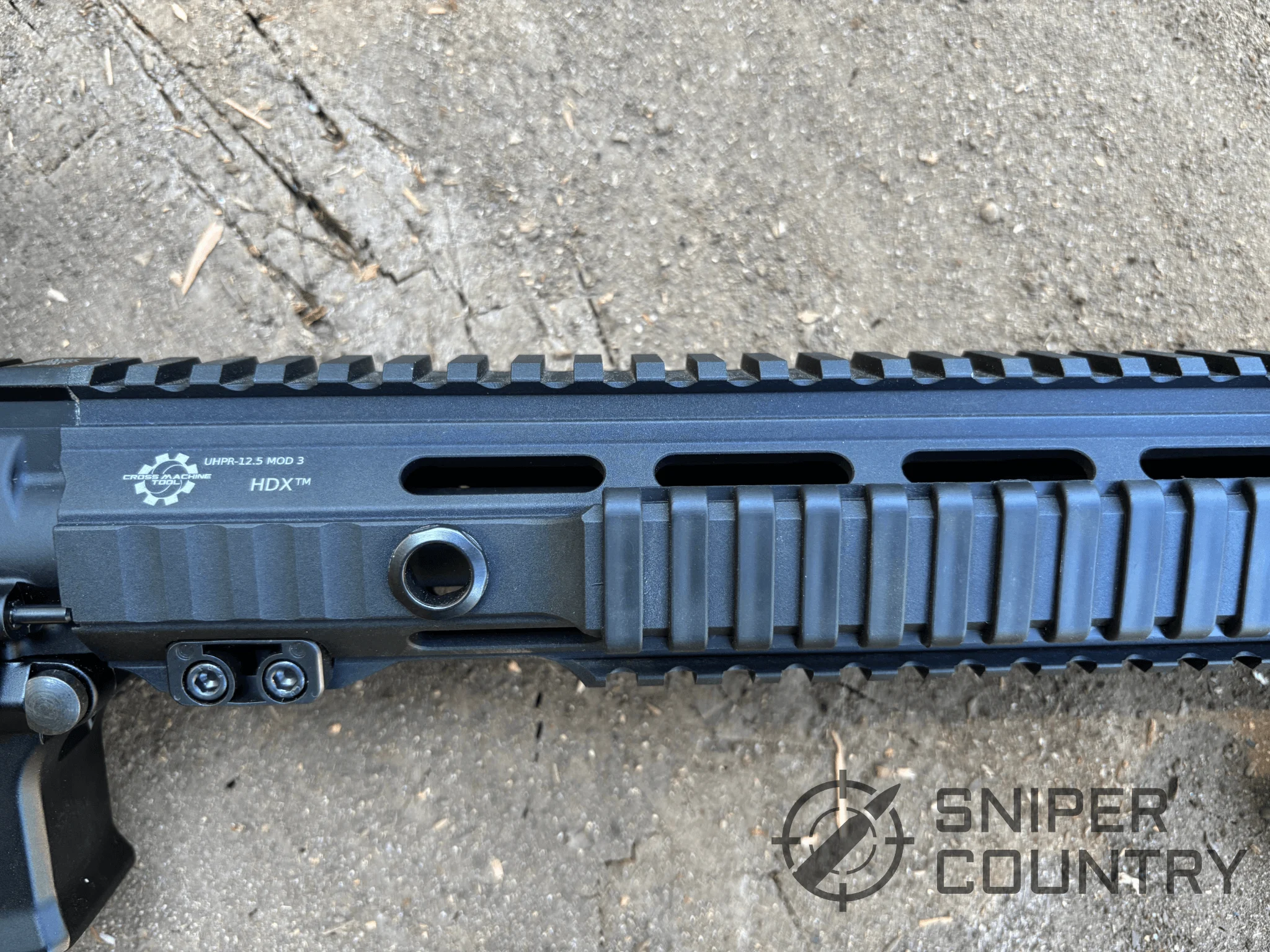
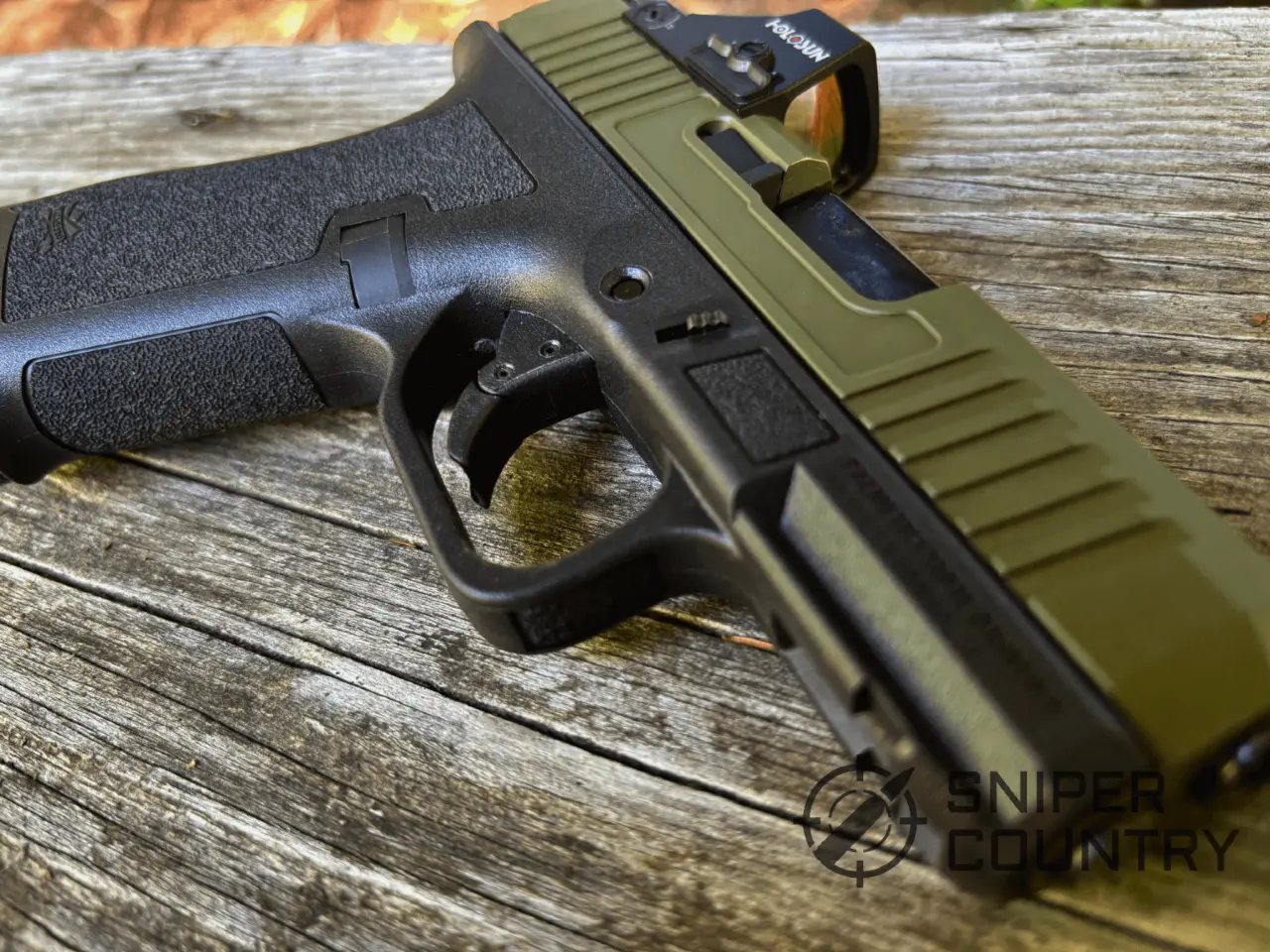
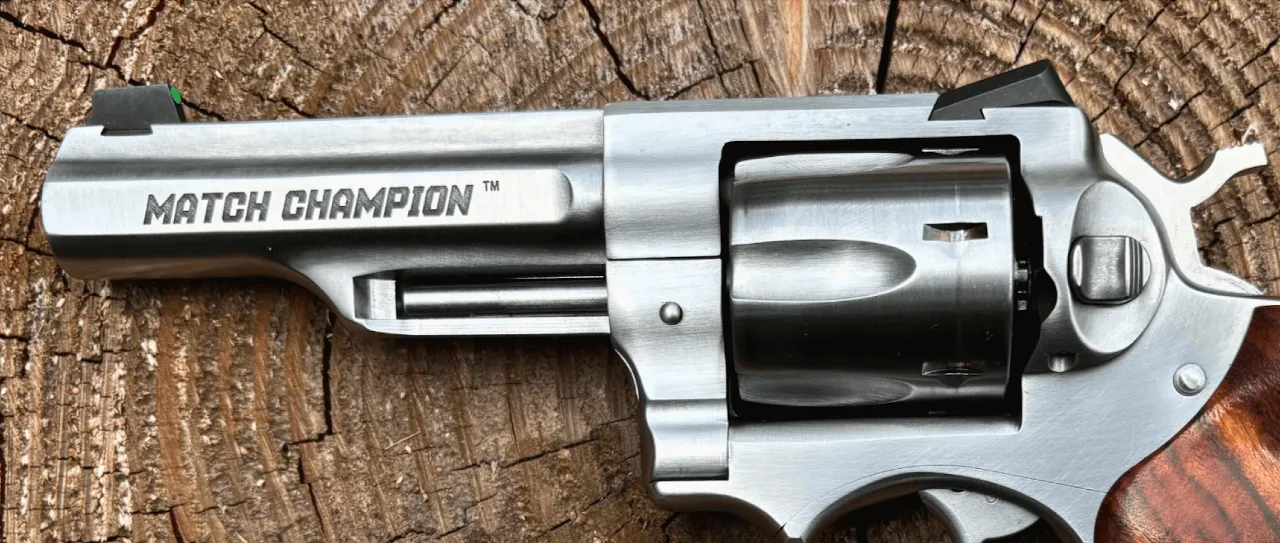


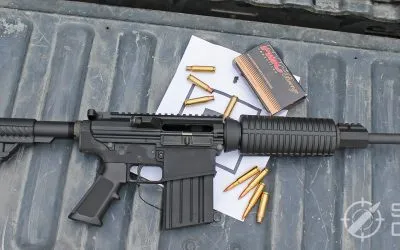
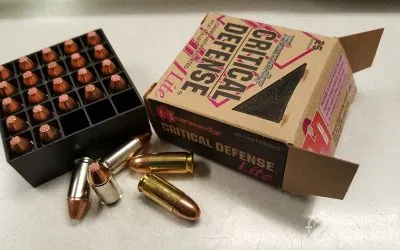
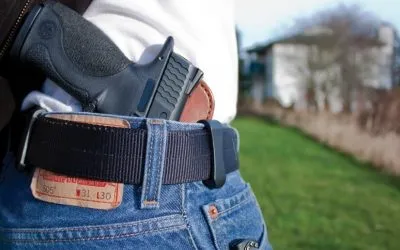
![9mm Glock Models [Ultimate Guide]](https://snipercountry.com/wp-content/uploads/2018/10/Glock-17-vs-Glock-19-vs-Glock-26-vs-Glock-41-vs-Glock-43-WM-400x250.webp)
![Handgun Caliber Chart [2025 Ultimate Guide]](https://snipercountry.com/wp-content/uploads/2018/10/Handgun-Caliber-Comparison-400x250.webp)
![Rifle Calibers [Ultimate Guide]](https://snipercountry.com/wp-content/uploads/2018/12/Header-1900-400x250.webp)





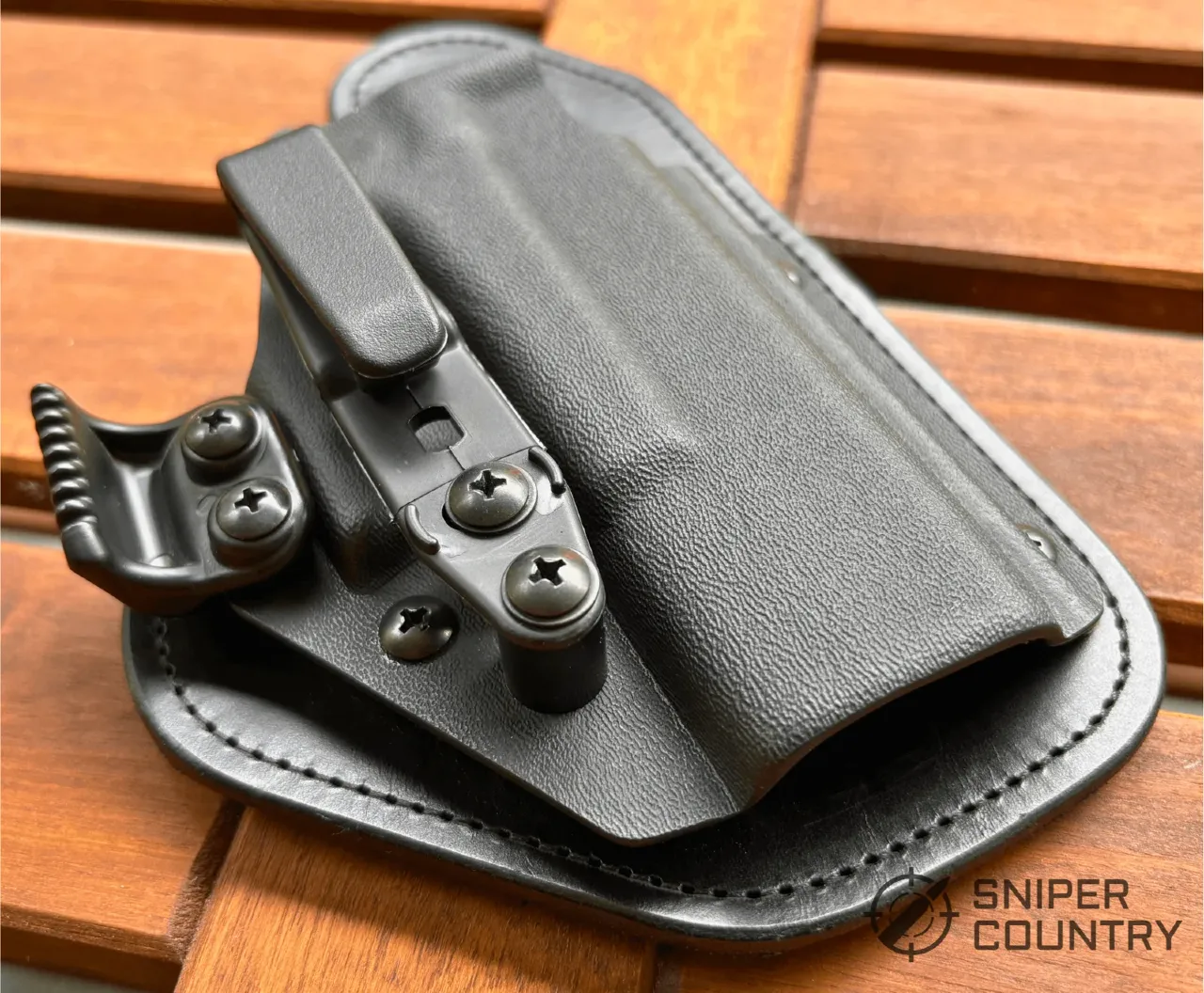


2 Responses
Thanks Mike for another informative article, I got into 1911s couple of years ago i love the way they shoot, the only draw back to this pistol is field stripping for cleaning I myself would stay away from it but everything else seen to point to a well crafted firearm. Have a great week
Marc, I appreciate your comments. I agree that field stripping is different with this pistol but it isn’t bad at all – just keep a hex key with your bushing wrench and cleaning supplies. Thanks for writing!